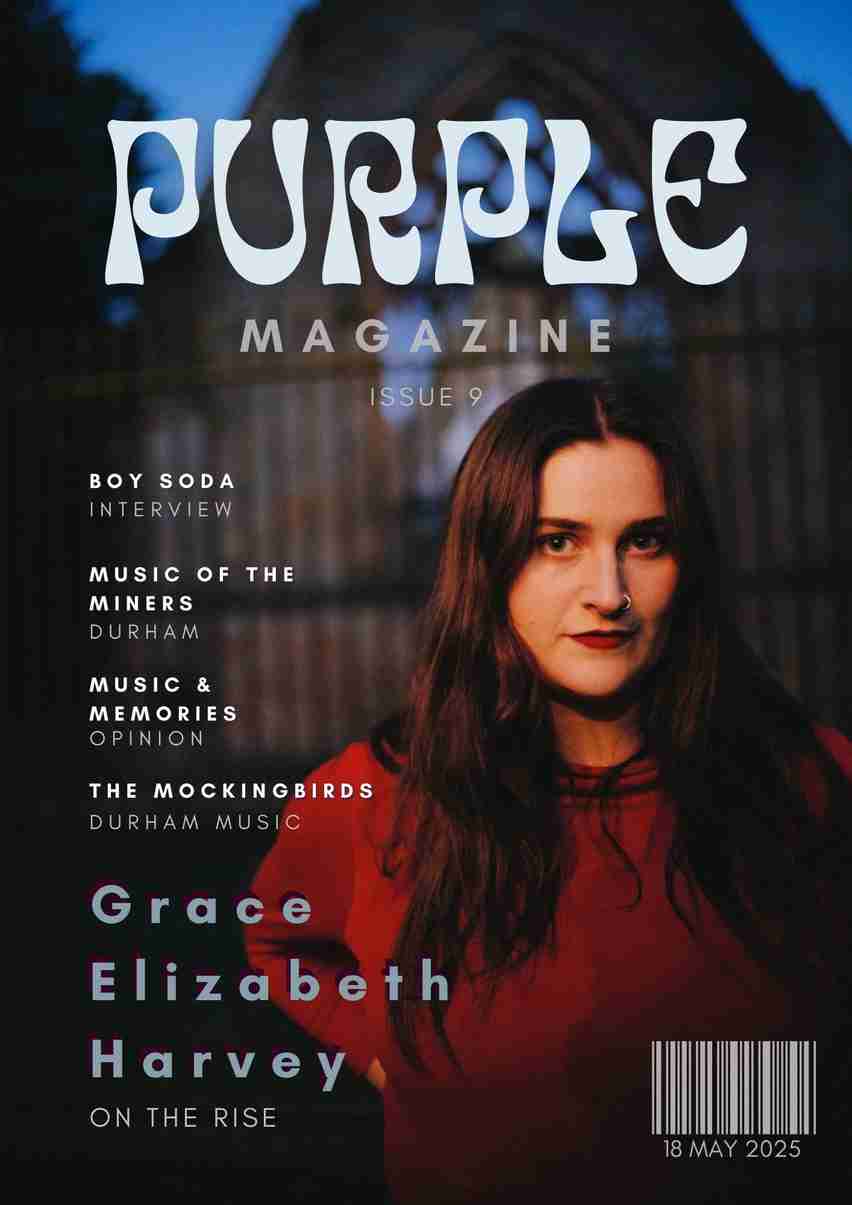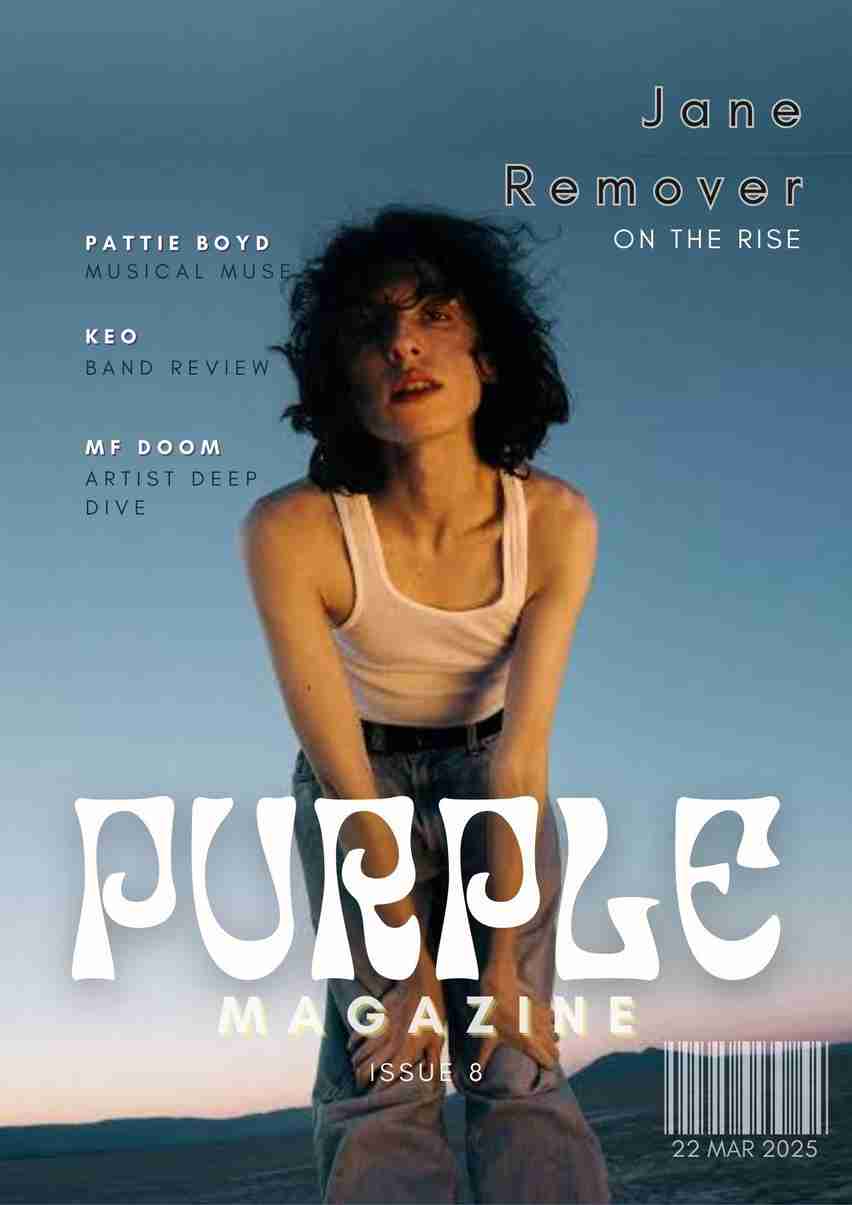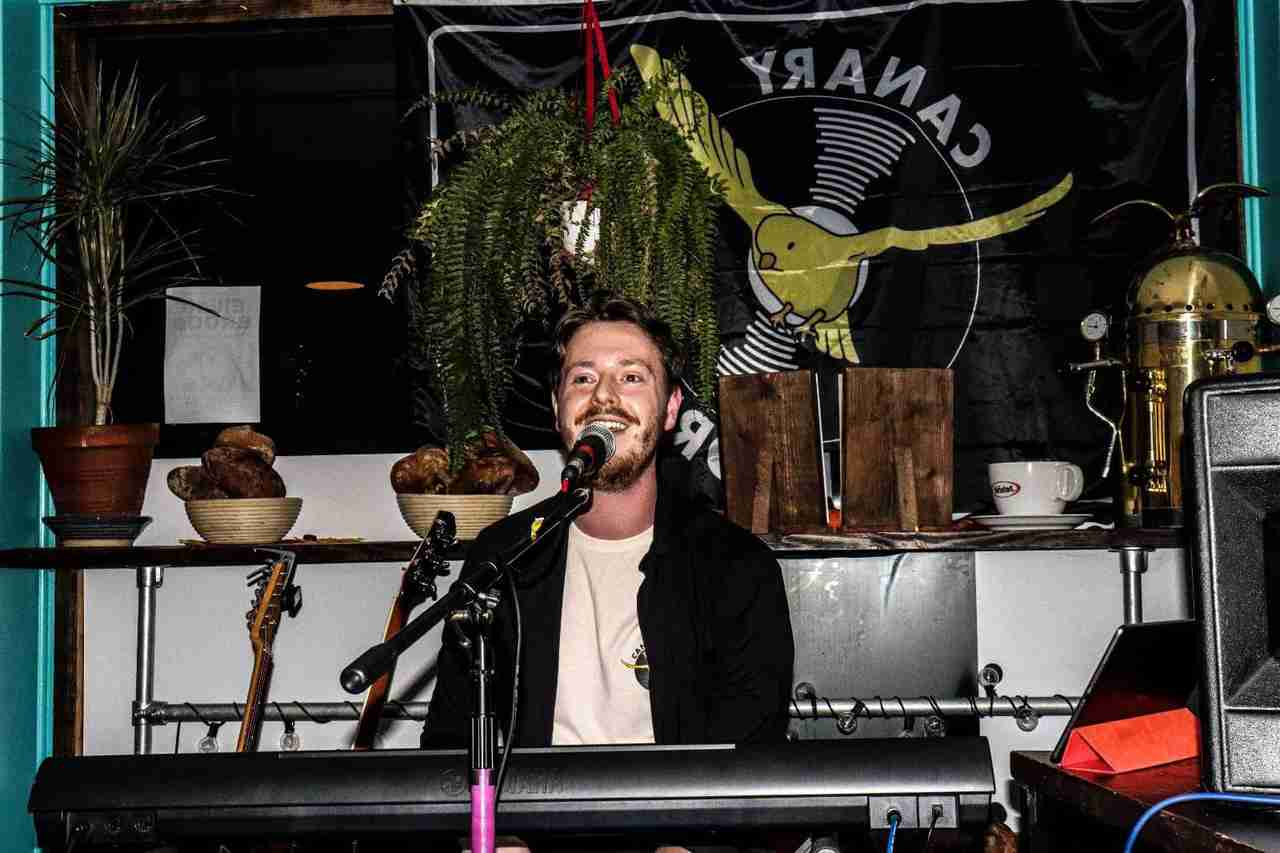Interview: George Bone
Having studied Music at Durham from 2017-2020, singer-songwriter and producer George Bone is currently hoping to have his own lo-fi pop-jazz tracks out in the new year!
Purple Music Team member Millie Cave chatted to him following his gig at Claypath Deli this past October about what it’s like to come back to Durham, the London music scene, and how he made his way into the industry.

M: How does it feel coming back to the Durham bubble, now as an ‘outsider’?
G: It’s really weird to come out of an environment, now I work in London. Coming back into the Durham bubble and students are going to lectures, they’re going to societies and it’s just really, really weird to look like a student and to not be one at the same time. It feels like a weird camouflage really.
M: Did you enjoy coming back? Are you going to come back for more gigs?
G: Oh God yeah, absolutely- as much as they can put up with me for! I knew Connor and Dan (Canary Records) from my work at DOMAN for the last two-and-a-bit years [...] and I’m doing a lot of production work for their artists. One day they were like ‘Hey, we’ve got a gig coming up mid to late October, [...] would you like to come in and do it?’ and I was like ‘Sure.’ Because I was interested to see what’s going on with the studio at Collingwood and how it’s shaping up, also at the same time introduce myself and my music to more people. On a very selfish note, it’s a great opportunity to network, and on a personal note it's good to make those personal connections that I can’t really do at a gig in London.
M: When you're closer to the audience, you can see their faces as well.
G: Exactly. I just had a look at the photos that were taken and there are some facial expressions from me that are awful! But at the same time it’s nice to know that you’ve got that audience as a musician. You can have a chat with people who are listening to your music, they can give feedback on it. It’s just good to have that in-person interactivity which you don’t get at a function gig in London, for example.
M: We’re all so used to the Durham music scene, but what are you currently loving about living in London? What are you doing?
G: Well, I’ll take that in two parts. The first part is Durham does have its own scene. The last few years has seen a large uptake into the contemporary music scene. Even synth music and stuff like that, that hasn’t necessarily come from the music department.’ So a lot of artists have been making their music while they’ve been based as students at Durham. India Arkin, James Hughes who was president of DOMAN last year, and even Grace Harvey and Jack Patrick who we saw at the Claypath Deli gig. But, Durham can only get you so far. It’s a very small environment and you want to get on to bigger things; you’ve only got a limited amount of time in Durham. It’s not really a cosmopolitan hub for musicians in general and so if you want to do anything you probably need to move down south.
I can use that academic knowledge as a strong point when I’m in London but I can’t rely on it. I knew I was a good analyst, I knew I was a good songwriter. I didn’t have very good production skills, which was the one thing I wanted to do better at. I couldn’t get other people to do it because it would be quite expensive, and they might not have the same vision as me. So I did a Master’s in Music Production at a studio about 15 minutes north of King’s Cross Station and it was a lovely experience, I got to see some really good artists and at the same time network with some big companies.
M: Do you see networking as key to getting into the music industry?
G: The skill of talking to people, the skill of being confident and getting your foot in there and fully being present is something that is a valuable tool in the music industry. Even if you’re meeting friends at gigs and stuff like that, or you’re playing, or your friend is headlining, it’s always important to make the time to go there if you can. Not only does it show you care because it’s objectively extra numbers for them, but it’s better for you because you create connections from artist to listener, from listener to listener.
Anyone that you meet there will see that you care about the artist and will introduce you to other people. Weirdly that’s how I got a few of my gigs recently. Around a fortnight ago I played keyboards for a really talented Dutch singer called Emma Robins and her manager had gotten in touch with me asking if I was able to learn six songs really quickly for a few of her music videos. Basically, I learned those songs and the manager got back to me and said ‘you did that really quickly, you got on with the band really well, I’d like you on all of her tracks.’
M: So, you got offered a job off the back of it?
G: Yeah essentially. I still feel like I have an element of Imposter Syndrome because, by my own admission, I’m not the most talented musician, but if it’s one thing that’s required in music, it’s being persistent. And the fact that I showed up, was very professional about it, and did it in a timely manner meant that I got the chance to be on all of their projects. So I’m doing a few sessions with her in London before the end of the year.
M: How does that imposter syndrome manifest itself for you?
G: I started ‘music’ very late. Whereas some musicians have been doing it since the age of 5. I didn’t know how to properly play the piano until I was about 14. I knew I could hold my own as a vocalist but I couldn’t necessarily rely on other people to come in on keys for me (similar to my urge to do my own production). So I needed to pick up those skills myself, but at the same time there’s always that sense that, if you’re self-taught, some things don’t come as easy for other people as they do you.
M: Is there a sense of prejudice from those musicians who’ve been doing it since they were five against those who got into it later?
G: Yes, and no. Yes that they’ve spent so much time honing their crafts and you’ve just sort of rocked up like ‘Hi, how are you?’ But at the same time no, not really because if there’s anything I’ve learnt in the last two years it’s that music is a collaborative process and sometimes things don’t work out. Being persistent, knowing who to talk to- a lot of it is being in the right place at the right time.
M: Would you recommend to current students, looking to get into the music industry, just to look for any opportunity even though it might not definitely be the type of music that they want to play or the type of band that they want to work with? Has that paid off for you?
G: Yes, absolutely. Firstly, apply for everything. I got a thousand rejection emails and that’s absolutely fine. But at the same time, there are always gonna be other opportunities. The stuff I was doing with Emma Robins a few weeks ago was not my cup of tea at all, it’s more sort of very contemporary pop stuff and some people would’ve disregarded it as a really simple job. But it’s the simple things that will get you there, it’s something on your CV, it’s something that you can say to people.
For some reason, as soon as you’ve performed at a London postcode then suddenly people will start to take you a lot more seriously because you’ve broken into that ecosystem, you’ve got your foot in the door. Any sort of opening that you can make for yourself; however hard iron fisted the door may be to hold open, you get in there and make the most of the opportunity.
M: How quickly did that pay off for you though? Are there times when you questioned yourself?
G: Doing my music stuff very late, I just about got the grades to get into Durham to do music, at A-Level I got 3 A*s and a B in music and I did a Music degree. It left me thinking, have I chosen the right path? And then when you see loads of really talented players come through; you’re trying to get in this bubble where you know you’re not as adept at those things and you become self-conscious, wondering whether you really deserve to be here.
Ultimately doing a lot of things made me come out of feeling inadequate, I needed to be in more exec positions, I needed to be in multiple groups and learning multiple bits of repertoire to show that I deserve this. I held networking events for DOMAN, we held songwriting camps, we built gigs back up off the floor and we sort of cemented our place in Durham’s music scene.
Weirdly, I felt another sense of imposter syndrome going back into London doing contemporary stuff, because I’m a lot more used to doing classical stuff. In London you’re like ‘I’ve now got imposter syndrome version 2, because I feel like my skill set that I’ve developed over the past 8 years doesn’t fit into what I am going into, and then you feel another wave of anxiety. I overcompensated into doing a lot of things, but all of those things opened doors I never could have imagined.
M: So what would you recommend to students reading this wondering how to get into the industry and how to keep going?
G: Well, first thing I would say is regardless of whatever job you get or place you get in academia or where you get a gig- people have looked at you and seen that they want you, so regardless of what other people think around you, you do belong there. And the second thing is just to make sure you don’t overstretch yourself, but keep active. Keep working to find where your limits are, even if it’s just posting a cover on Instagram which you don’t think will do really well- post it, be consistent with it. Even if it’s a gig that you don’t think many people will go to, do it. You can say that you’ve gigged in that place, no one will need to know the numbers. For example, this summer I had a gig at the beginning of a showcase off Trafalgar Square and now I can say I opened a showcase off Trafalgar Square, which is really cool!
If you get an email that you really want to respond to, answer that email instead of worrying about how you are going to respond to it. If you get a call about an opportunity, think about it hard because you may not get that call again. It could be that one step you need to take. I realise I may sound like the w*nkiest person in the world by saying it, but it all does work. You may not see it in the short term, but people do care about your music. All you need to do is take that first step.
M: What can we expect from you in the future?
G: Currently I’m on keys for a lot of other musicians at the moment, when I get back to London, I have a gig on Friday that I need to do a lot of rehearsal for. I’m producing a few songs for a musician called Darcy Blue at the moment and those tracks will be released for Christmas, and one in the new year. And I’ve just applied for Next Gen PRS funding for a few singles and an EP for myself, so hopefully those will be out in February, March and July. Depending on when Durham wants me back, I would love to come and show them in a live session!
By Millie Cave
Recent Posts
Why don't you check some of our other posts?

